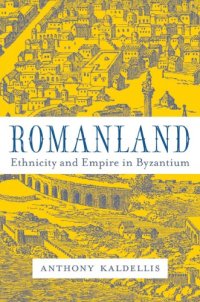
Ebook: Romanland: ethnicity and empire in Byzantium
Author: Kaldellis Anthony
- Tags: Civilization--Roman influences, Cultural pluralism, Cultural pluralism--Byzantine Empire, Ethnic relations, HISTORY--Ancient--General, National characteristics Roman, Romans, Romans--Byzantine Empire, Romans--Ethnic identity, SOCIAL SCIENCE--Discrimination & Race Relations, SOCIAL SCIENCE--Minority Studies, Electronic books, History, Romans -- Byzantine Empire, Romans -- Ethnic identity, Byzantine Empire -- Civilization -- Roman influences, Byzantine Empire -- Ethnic relations, Cultural pluralism -- Byzantine E
- Year: 2019
- Publisher: The Belknap Press of Harvard University Press
- City: Byzantine Empire
- Language: English
- pdf
A history of denial -- Roman ethnicity -- Romanland -- Ethnic assimilation -- The Armenian fallacy -- Was Byzantium an empire in the tenth century? -- The apogee of empire in the eleventh century.;Was there ever such a thing as the Byzantine Empire and who were those self-professed Romans we choose to call "Byzantine" today? At the heart of these two interlinked questions is Anthony Kaldellis's assertion that empires are, by definition, multiethnic. If there was indeed such a thing as the Byzantine Empire, which rules bounded majority and minority ethnic groups? The labels for the minority groups in Byzantium are clear - Slavs, Bulgarians, Armenians, Jews, Muslims. What was the ethnicity of the majority group? Historical evidence tells us unequivocally that no card-carrying Byzantine ever called himself "Byzantine." He would identify as Roman. This line of identification was so strong in the eastern empire that even the conquering Ottomans saw themselves as inheritors of the Roman Empire. In Western scholarship, however, there has been a long tradition of denying Romanness to Byzantium. In the Middle Ages, people of the eastern empire were made "Greeks," and by the nineteenth century they were shorn of their distorted Greekness and turned "Byzantine." In Romanland, Kaldellis argues that it is time for historians to take the Romanness of Byzantines seriously so that we can better understand the relations between Romans and non-Romans, as well as the processes of assimilation that led to the absorption of foreign groups into the Roman genos.--
Download the book Romanland: ethnicity and empire in Byzantium for free or read online
Continue reading on any device:

Last viewed books
Related books
{related-news}
Comments (0)